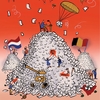De Tweede Wereldoorlog in de Lage Landen
Bedenkingen bij vijftig jaar oorlogshistoriografie in de BMGN
DOI:
https://doi.org/10.51769/bmgn-lchr.9818Abstract
De evaluatie van vijftig jaren kopij over de Tweede Wereldoorlog in de BMGN – Low Countries Historical Review (BMGN) levert een rijk maar eenzijdig beeld op. Vooral het feit dat de Belgisch-Nederlandse uitwisseling nooit echt van de grond kwam, mag gezien het oorspronkelijke doel van de BMGN een gemiste kans worden genoemd. Helemaal onlogisch is het echter niet: de Belgische en Nederlandse WOII-geschiedschrijving kenden uiteenlopende nationale ontwikkelingen. Zeker de paradigmatische kaders ontwikkelden zich anders en hadden uiteindelijk zelfs tegengestelde effecten: van een situatie van scherpe polarisering in Nederland tot makke consensus in België. Dat maakt een Belgisch-Nederlands gesprek niet vanzelfsprekend. We bedoelen misschien ongeveer hetzelfde met het begrip ‘accommodatie’, maar de specifieke ladingen die dat begrip heeft gekregen, zijn intussen helemaal anders. De concrete voorwaarden creëren voor een Belgisch-Nederlandse uitwisseling binnen dit onderzoeksveld blijft dus een werf, ook voor de BMGN. Deze interactie zou beide nationale historiografische tradities wellicht verrijken.
The evaluation of fifty years of copy about World War II in the BMGN – Low Countries Historical Review (BMGN) yields a rich but one-sided impression. That the Belgian-Dutch exchange never truly got under way may, given the original goal of the BMGN, be considered a missed opportunity. All the same, this is not entirely illogical: Belgian and Dutch WWII historiography followed divergent national trajectories. Especially the paradigmatic contours emerged differently and ultimately even brought about contradictory effects, from deep polarisation in the Netherlands to meek consensus in Belgium. This does not make a Belgian-Dutch dialogue selfevident. We possibly may use the concept ‘accommodation’ with a similar meaning, but the specific connotations that the concept has acquired are by now entirely different. Bringing about the concrete conditions for a Belgian-Dutch exchange within this research field is therefore an ongoing project, even for the BMGN. Such interaction would surely enrich both national historiographic traditions.
Downloads

Downloads
Additional Files
Published
Versions
- 2021-11-01 (2)
- 2021-07-05 (1)
Issue
Section
License
Copyright (c) 2021 Nico Wouters

This work is licensed under a Creative Commons Attribution 4.0 International License.
Authors who publish with this journal agree to the following terms:
a) Authors retain copyright and grant the journal right of first publication with the work simultaneously licensed under a Creative Commons Attribution 4.0 International (CC BY 4.0) that allows others to share the work with an acknowledgement of the work's authorship and initial publication in this journal.
b) Authors are able to enter into separate, additional contractual arrangements for the non-exclusive distribution of the journal's published version of the work (e.g., post it to an institutional repository or publish it in a book), with an acknowledgement of its initial publication in this journal.
c) Authors are permitted to post their work online (e.g., in institutional repositories or on their website) prior to and during the submission process.
Authors are explicitly encouraged to deposit their published article in their institutional repository.








